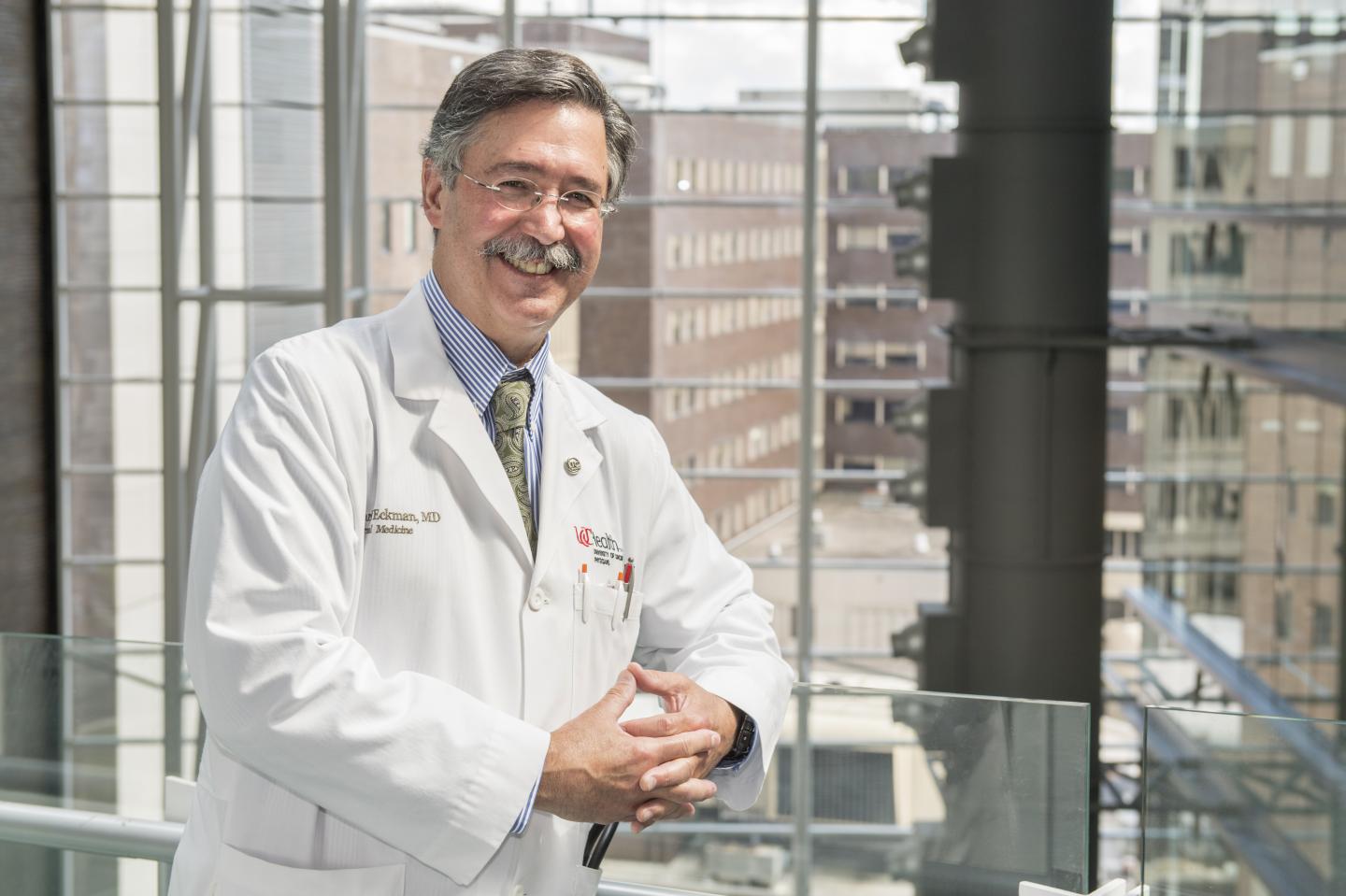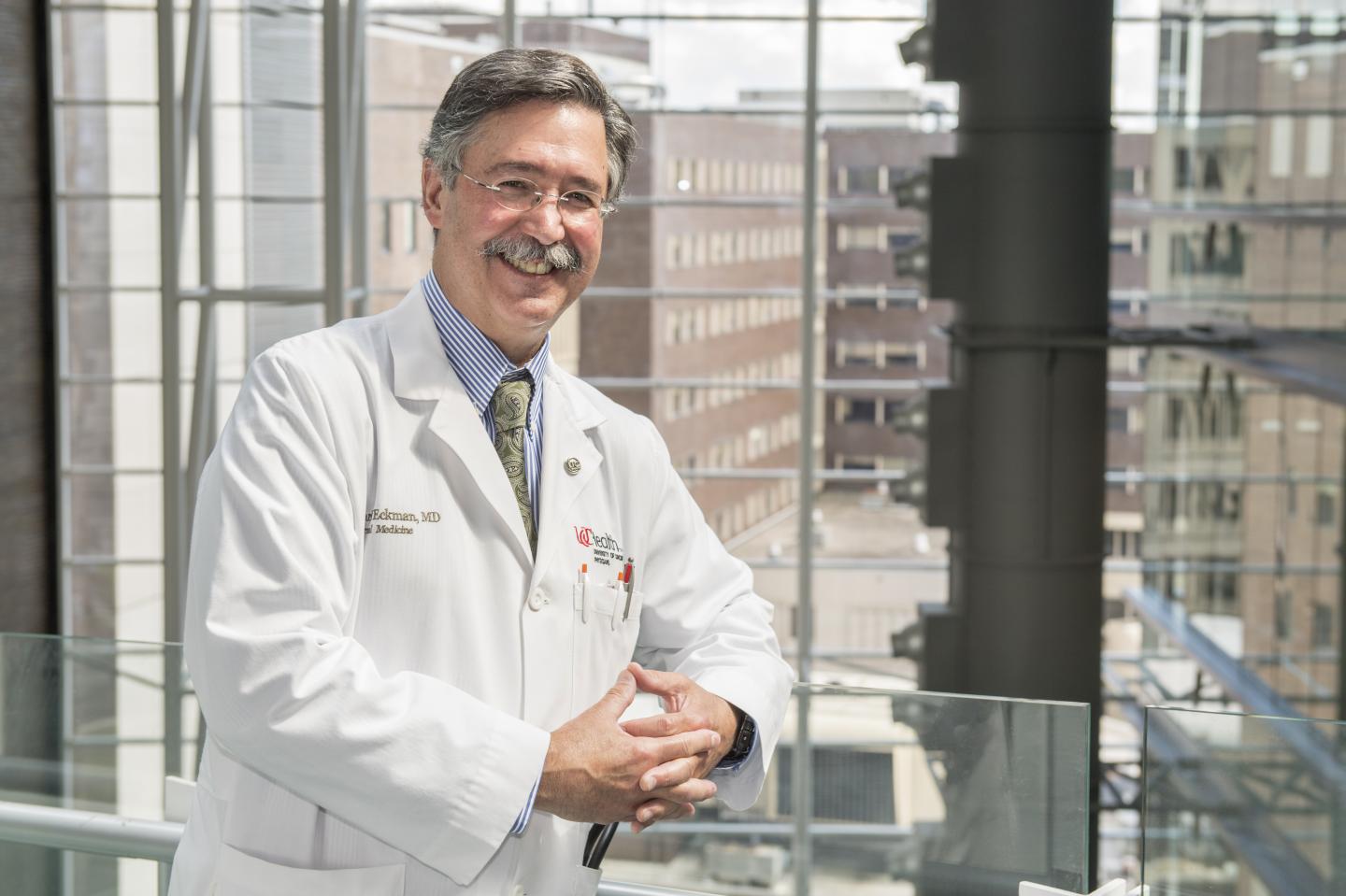
Credit: University of Cincinnati College of Medicine
Physicians are encountering a growing number of younger patients who are testing positive for hepatitis C virus (HCV) fueled largely by the opioid crisis impacting communities around the country. That increase and more effective and tolerable drug regimens for HCV infection, means one-time universal screening of all adults for HCV is now cost effective and recommended, say physician-researchers in the University of Cincinnati (UC) College of Medicine.
The researchers used a computerized Markov state transition model to estimate the impact of one-time universal screening of adults 18 years of age and older compared either with no screening at all or with the current guideline-based strategy of largely screening baby boomers–adults born between 1945 and 1965–for HCV, says Mark Eckman, MD, Posey Professor of Clinical Medicine and Director of UC Division of General Internal Medicine.
They measured effectiveness with quality-adjusted life years (QALYs)–that's the gain of in life expectancy adjusted for the quality of life–and costs from the health system perspective in 2017 U.S. dollars, says Eckman, lead author of the study and a UC Health physician. Universal screening followed by guideline-based treatment of all those with chronic HCV infection has an incremental cost effectiveness ratio of $11,378 per quality-adjusted life year compared with birth cohort-based screening alone.
"Most health economists consider anything less than $50,000 per quality-adjusted life year to be highly cost-effective," says Eckman.
The results of the study are available online in the scholarly journal Clinical Gastroenterology and Hepatology.
The Centers for Disease Control and Prevention (CDC) estimates 2.7 million individuals in the U.S. have chronic HCV infection with 81 percent of that group consisting of baby boomer adults. In 2011, in addition to testing individuals at high risk due to intravenous drug use or other possible exposures to HCV, the CDC recommended one-time testing for the baby boomer cohort. That recommendation was later endorsed by the U.S. Preventive Services Task Force.
But since then the face and treatment of hepatitis C has changed.
"So what happened to make it reasonable to screen a wider population for HCV?" asks Eckman. "The incidence of hepatitis C among younger drug-injecting patients is skyrocketing so we have a blip in HCV cases that's no longer isolated to the baby boomer cohort.
"We are also now in an era of HCV treatments that are more effective than even five or six years ago. Furthermore, these new regimens are easier to tolerate, have fewer severe side effects and require a short period of treatment," says Eckman.
"All these factors coming together are what drove the model to show that screening a broader population than just the baby boomer cohort is effective," says Eckman,
The baby boomer generation came of age during a time of experimentation, and many individuals who may have tried injectable drugs, even once, and never thought of themselves as having a problem, may be infected with the hepatitis C virus, says Eckman. "While these silent cases have been hanging out for decades what has changed recently is the new epidemic of hepatitis C in younger patients related to drug use," he says.
Eckman says the cost to treat HCV can range from $9,000 to $30,000 per month depending on the medications being used, and that many health insurance plans, including Medicare Part D and most Medicaid plans cover the costs of treatment. For individuals without health insurance, treatment may remain a challenge, he adds.
Eckman says the U.S. Preventive Services Task Force is currently reviewing and updating guidelines for hepatitis C and it's possible a broadening of the current screening recommendations may occur.
###
"Early diagnosis and treatment of hepatitis C infection prevents development of progressive liver disease, and reduces long-term risk of cirrhosis, liver cancer and other HCV-associated health problems," says study co-author and liver expert, Kenneth Sherman, MD, PhD, Gould Professor of Medicine and Director in the UC Division of Digestive Diseases.
John Ward, MD from the Task Force for Global Health and the Centers for Disease Control and Prevention is also a co-author of the study. Funding for the study came from the CDC Foundation along with support coming from multiple donors to the CDC Foundation's Viral Hepatitis Action Coalition.
Sherman has grants/contracts (institutional funding) from AbbVie, Bristol-Myers Squibb, Gilead, Inovio, Intercept, MedImmune, and Merck, and serves on advisory boards for Abbott Laboratories, Gilead, MedImmune, Merck, and Inovio. Sherman also serves on safety monitoring boards for Watermark and MedPace. Eckman has grant support from Merck through the Merck Investigator Studies Program.
Media Contact
Cedric Ricks
[email protected]
513-558-4657
@UCHealthNews
http://www.healthnews.uc.edu





